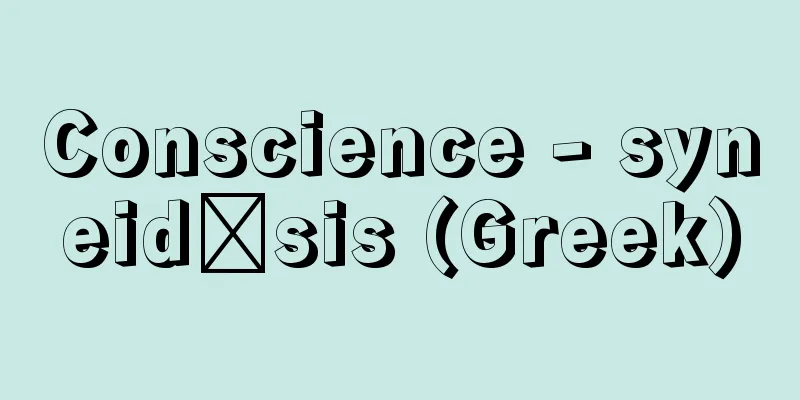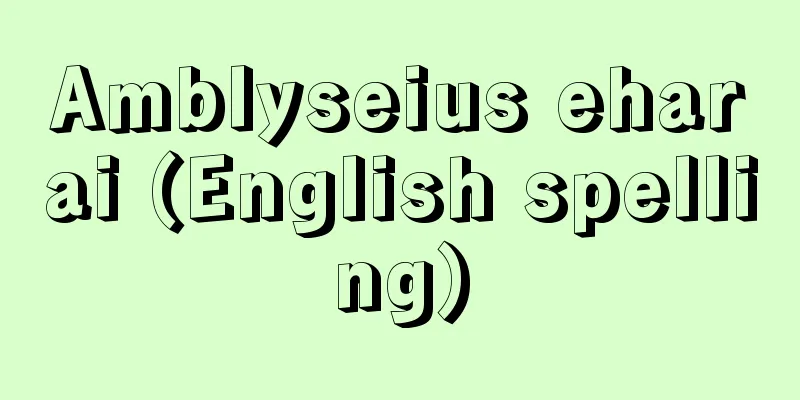Conscience - syneidēsis (Greek)

|
A term in moral philosophy. Refers to the intuitive ability to sense and judge the good and evil of one's own existence and actions. Human beings are placed in relationships with many things in the world through their cognition and actions. The human self exists when these relationships are recognized as one's own. Self-consciousness is the act of self-cognition made manifest in the self. What is recognized in self-consciousness is not simply the empty form of the self in which one is oneself, but the consciousness of the various other things with which one is related, and the consciousness of oneself as being related to these various other things. However, when one is consciously aware that this is one's existence and one's action, a second voice of the self arises within oneself, trying to approve or reject the recognition of this as one's own. This is the voice of conscience. It has the following characteristics: (1) it is a voice that arises from the depths of the self that is normally unconscious, based on the premise of a conscious self; and (2) it is a voice that is related to and judges the good and evil of the self. The voice of conscience is most acutely aware of evil acts that one has committed (the pangs of conscience) because it is difficult to reject the fact that one's actions are one's own, and because it is difficult to accept that an act one has committed is bad and therefore difficult to accept as one's own. Therefore, conscience is the consciousness and intuition of the self's inherent relationship to goodness at a deep level that is not necessarily conscious of the superficial self. It is the core of the self that forms the self at a deep level, and forms the self as a personality. The fact that humans are inherently related to goodness and have a moral consciousness is given in conscience. When humans lose their conscience, they lose their inner self and become an empty shell of the surface. However, conscience is also socially formed, and has the reality of being a social moral consciousness (society can be a country, a group, a family, etc.). Therefore, it cannot be said that the judgment of right and wrong based on conscience is infallible. When rational reflection on beauty and ugliness, right and wrong, and good and evil is added to this, conscience as a subjective moral consciousness is formed into universal morality. The reality of human moral consciousness is most clearly expressed in conscience. The fundamental structure of moral philosophy shifts subtly depending on whether one emphasizes the fundamental, individual, or social aspects of conscience. [Nobuaki Kato] [Reference] |Source: Shogakukan Encyclopedia Nipponica About Encyclopedia Nipponica Information | Legend |
|
道徳哲学の用語。自己の存在および行為について、その善悪を感知し裁定する直覚的な働きをいう。 人間はその認識と行動によって世界のうちの多くのものとのかかわりのうちに置かれている。このかかわりが自己のものとして認知されるところに人間の自己がある。この自己認知の働きが自己に顕在化しているものが自己意識である。自己意識において意識されるのは、ただ自己が自己であるという空虚な自己の形式ではなく、自己のかかわる他のさまざまなものの意識であり、この他のさまざまなものへとかかわっているものとしての自己の意識である。しかし、これが自己の存在であり、自己の行為であるということが顕在的に意識されるときに、自己のうちにはこれを自己自身のものとして認めることを是認したり、拒否したりしようとする第二の自己の声がおこってくる。これが良心の声である。 それは〔1〕顕在的な自己意識を前提にしたうえで、平常は意識されない自己の深層からおこる声であり、〔2〕自己自身の善悪にかかわり、これを裁定する声であるという特徴をもつ。自らなした行為が自己自身のものであることを拒みがたいということ、また、その自己のなした行為が悪いものであるとき、これを自己のものとして認めることを是認しがたいという二つのことによって、自己のなした悪なる行為において良心の声はもっとも先鋭に意識される(良心の呵責(かしゃく))。それゆえ、良心とは表層的な自己にはかならずしも意識されていない深層における自己の、善への本性的なかかわりの意識であり、直覚である。それは深層において自己を形成する自己の核であり、自己を人格として形成する。人間が本性上、善にかかわるものであり、道徳意識をもっていることの事実は良心において与えられている。良心を失うとき、人間は自己の内面を失い、表層だけの抜け殻となる。 しかし、良心は社会的に形成されるものでもあり、社会的な道徳意識としての事実性をもつ(社会は国、集団、家などさまざまでありうる)。それゆえ、良心による善悪の裁定が不可謬(ふかびゅう)であるとはいえない。美醜、正不正、善悪に関する理性的な反省がこれに加わるとき、主観的な道徳意識としての良心は普遍的な道徳性へと形成される。 人間の道徳意識の事実は良心にもっとも如実に表出されている。良心のもつ根源性、個人性、社会性という面のどれを強調するかによって道徳哲学の原理的な構成は微妙にずれてくる。 [加藤信朗] [参照項目] |出典 小学館 日本大百科全書(ニッポニカ)日本大百科全書(ニッポニカ)について 情報 | 凡例 |
<<: Conscientious objection - ryousintekiheikikyohi
Recommend
'Abd Allāh b.Husayn
1882‐1951 The first king of Jordan. Second son of ...
Linaria japonica Miq.
A perennial plant of the Scrophulariaceae family t...
Sea anchor - Kaibyo
A sea anchor is a device that is dropped into the ...
Indian rice
… There are only four species of Zizania in the w...
Asiatic buffalo
...Wild species are distributed in the tropical r...
Madrigal
In Italian, it is called madrigale. (1) A small ly...
Tonari Gumi - Tonari Gumi
A lower level organization of the neighborhood as...
Codium cylindricum (English spelling) Codium cylindricum
… [Reiko Nagata]. … *Some of the terminology that...
hymnos
…Christian chants, originating from the Greek hym...
Musashi Hills Forest Park
This national park is located in central Saitama ...
Arnold Böcklin
Swiss painter. Born in Basel on October 16th, he ...
Sabato, E. (English spelling)
...From the beginning of the 1960s, as if in sync...
Chuo-geng-lu (English: Record of cultivation)
An essay from the late Yuan Dynasty in China. The ...
Kanjuji-ryu
...A family that originated from Confucianism, pa...
Kawachi administration
...In addition, the existence of the first 9 empe...









